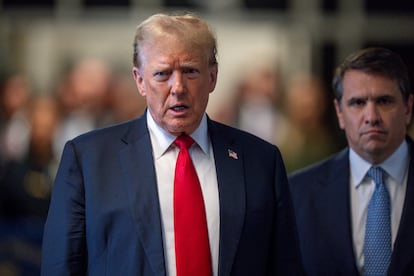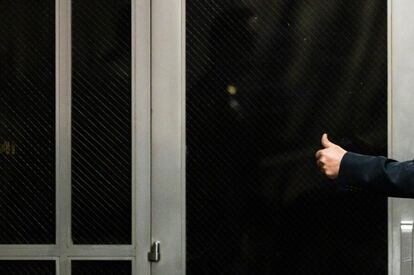Trump’s defense stokes doubts to force mistrial in the Stormy Daniels case
After six weeks and 22 witnesses, the trial has concluded with the closing arguments of both sides. Now it is over to the jury, which must reach a unanimous verdict


After six weeks of hearings, 22 witnesses (only a couple for the defense) and two convictions for contempt against Donald Trump, the first criminal trial against a former US president comes to an end on Tuesday with the closing arguments of the defense, then the prosecution, which has the burden of proof.
The case will then be over to the jury, the 12 Manhattan residents — seven men and five women — who must reach a unanimous verdict. No one has dared to predict when this happens. Whatever the jury decides, the verdict will not only be a milestone in the strangest electoral race in U.S. history, but also shape the expectations of Trump, who is accused of 34 counts of falsifying business records over hush money paid to the porn actress Stormy Daniels. Trump has pleaded not guilty to the charges.
In a last attempt to convince the jury, or rather to confuse it, the defense centered its closing arguments on questioning the credibility of Michael Cohen, Trump’s former personal lawyer and who says he was personally tasked with paying $130,000 to Stormy Daniels to ensure she kept quiet over her alleged affair with Trump. This payment — which was made during the final stretch of the 2016 election campaign — was recorded as “legal expenses” by the Trump Organization. But the prosecution argues the money was spent to stop the scandal from coming out and hurting Trump’s chances at the polls. Cohen’s statement underpins the prosecution’s entire case.
But in the closing arguments, Trump’s lead defense attorney, Todd Blanche, argued that Cohen’s testimony couldn’t be trusted. “He. Lied. To. You,” Blanche said of Cohen, who admitted last week on the stand not only to committing perjury, but also to stealing $300,000 from the Trump Organization. “He came in here, he raised his right hand and he lied to each of you repeatedly. You cannot send someone to prison, you cannot convict somebody based upon the words of Michael Cohen.”
Blanche went on to portray Stormy Daniels as an opportunist who saw a chance to profit financially from the scandal from the notorious Access Hollywood tape, in which Trump is heard making denigrating remarks about women. The recording was leaked in September 2016, a month before the hush payment.
Blanche showed the jury the bank statement where former Trump Org. CFO Allen Weisselberg summed up the $420,000 repayment to Cohen: the hush money payment, plus a bonus and taxes. The fact that Weisselberg — the man who managed all the accounts of the Trump emporium — has not been called to testify has raised more than a few questions. By bringing him up now, the defense seemed to reproach the prosecution for leaving out a high-ranking official and basing the entire indictment on the unreliable Cohen, who was repeatedly accused by the defense of lying. Except for the expected mention of Weisselberg — twice convicted of fraud and perjury — there were no further blows from the defense. At Tuesday’s hearing, the former president was surrounded by almost all of his adult children.

The closing arguments were also a key moment for the prosecution, as it had to corroborate Cohen’s testimony through the 34 allegedly forged documents to convince the jury that, as the former lawyer explained in his deposition, Trump orchestrated a scheme to conceal from voters — especially female voters — information that could hurt his chances of winning the presidency. According to Cohen, he helped orchestrated a plot with Trump and tabloid publisher David Pecker to bury any stories that could possibly damage Trump’s presidential bid. The hush money paid to Daniels was the final step, but not the only one: former model Karen McDougal also received money in exchange for her silence. What is on trial in New York is not an extramarital affair of the candidate for the 2016 elections, which he would end up winning, but what it subsequently entailed: the payment of hush money to ensure the scandal did not affect his presidential campaign. After the lunch break, the prosecution’s conclusion was scheduled to begin.
In addition to all the unprecedented circumstances surrounding the trial — the first of four criminal trials against the presumptive Republican nominee, and the only one to conclude before the November election — the hearings held in the dingy Manhattan criminal court building cast an unfamiliar picture of Trump. There was Trump, a man forcibly silenced by a judge’s gag order to prevent him from criticizing witnesses and court officials; an asinine, bored and sleepy Trump (Sleepy Don, as his detractors joked, copying the slogan the Republican coined in 2020 for his Democratic rival Joe Biden); a Trump who continually complained of the cold, who did look the witnesses in the eyes — he avoided especially meeting the gaze of Daniels and Cohen — and only seemed to bounce back in the courtroom hall, with his improvised rallies in front of the press. The usual Trump, in angry mode, then regained his belligerence on social media. This very Monday, a federal holiday on the occasion of the solemn Memorial Day, he called all his opponents “human scum.”
Remaining criminal trials
In the almost three-hour long closing arguments, Trump’s lawyer did not have to convince the entire jury that his client is innocent: he only needed to stoke doubts in one juror to prevent a unanimous verdict. This could force the judge to declare the trial a mistrial, which would mean it would be held again (presumably, on dates already marked in red on the electoral calendar). Any result that does not end in a conviction would boost Trump’s political goals.
A sentence — Trump is facing a maximum of four years in prison, although in practice it would be suspended because he has no criminal record — would not prevent him from standing for election. But as it is a state case, Trump would not be able to pardon himself if he was elected in November. In the long judicial ordeal, where Trump faces with even more politically serious cases in Washington (over the assault on the Capitol), Georgia (attempted election subversion) and Florida (withholding classified documents), Trump has made a political virtue out of adversity, playing the victim to win over votes and raise campaign funds. His lead over Biden in many polls — especially in the swing states that can decide the outcome in November — shows that, far from hurting his chances, the legal offensive against him has strengthened his campaign.
Trump has taken advantage of the priceless set offered by his entrances and exits of the courtroom to denounce again the “electoral interference” of “crooked Joe Biden, the worst president in the history of our country.” “It’s going after Joe Biden’s political opponent because he can’t do it himself,” said the former president on Tuesday. “Donald Trump did nothing wrong,” he said, citing a comment in the press. “This is everybody saying it, except we have a judge [Juan Merchan] who is corrupt. We have a judge who is conflicted. You know what the conflict is, so do I, but I can’t say it because I’m under a gag order which is another unconstitutional thing [...] This is a first. No president has not been allowed to speak,” he added, as if “president” were a title granted in perpetuity.
Sign up for our weekly newsletter to get more English-language news coverage from EL PAÍS USA Edition
Tu suscripción se está usando en otro dispositivo
¿Quieres añadir otro usuario a tu suscripción?
Si continúas leyendo en este dispositivo, no se podrá leer en el otro.
FlechaTu suscripción se está usando en otro dispositivo y solo puedes acceder a EL PAÍS desde un dispositivo a la vez.
Si quieres compartir tu cuenta, cambia tu suscripción a la modalidad Premium, así podrás añadir otro usuario. Cada uno accederá con su propia cuenta de email, lo que os permitirá personalizar vuestra experiencia en EL PAÍS.
¿Tienes una suscripción de empresa? Accede aquí para contratar más cuentas.
En el caso de no saber quién está usando tu cuenta, te recomendamos cambiar tu contraseña aquí.
Si decides continuar compartiendo tu cuenta, este mensaje se mostrará en tu dispositivo y en el de la otra persona que está usando tu cuenta de forma indefinida, afectando a tu experiencia de lectura. Puedes consultar aquí los términos y condiciones de la suscripción digital.








































